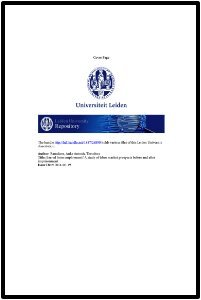Barred from Employment? A study of labor market prospects before and after imprisonment
By A.A.T. Ramakers
Practically all prisoners eventually return to free society. Considering their high rates of subsequent recidivism, more insight into post-prison circumstances is vital. Such knowledge is scarce, and it also remained unclear thus far to what extent imprisonment caused these individuals to lose their integration with the community. Scholars, professionals and prisoners themselves note that the path to a successful reentry critically depends on the transition to employment. Yet, imprisonment bars offenders from employment during imprisonment and might also limit their post-prison employment prospects. Using data of the Prison Project – a longitudinal study of almost 2,000 prisoners – this thesis examines men’s labor market experiences before and after imprisonment and studies whether recidivism risks are lower among employed versus unemployed ex-prisoners. The results show that most prisoners face a severe human capital deficit even long before they enter prison. After release many remain unable to (re)integrate into the labor market. Only longer spells (exceeding six months) seem to further deteriorate the already poor employment prospects. Among working ex-prisoners, those who are able to return to a previous employer or hold down their job during the first half year following release recidivate significantly less.
Leiden, Netherlands: Leiden University, 2014. 217p.


